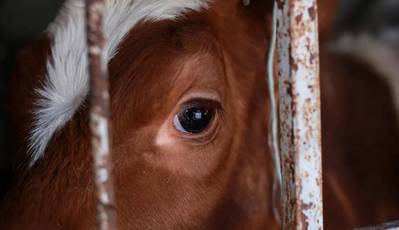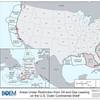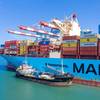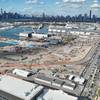Concerns Voiced over Potential Restart of New Zealand’s Live Export Industry
The New Zealand government may restart the live export trade which has been banned since May 1, 2023.
The ban was imposed in response to veterinarians, animal welfare advocates and the New Zealand public decrying conditions and outcomes for the animals. There have also been multiple disasters for the industry.
Animal welfare group SPCA says politicians claiming to be champions of farming and business do not have the support of all farmers or a business case for it.
“Government would have the public believe that any opposition to their plan is anti-farming,” says SPCA’s Chief Scientific Officer Dr Arnja Dale. “It’s about animal welfare and farmers agree.”
SPCA says the live export lobby in New Zealand is made up of corporates, some with co-directorships registered to addresses in China and Australia. It is unclear what value live exports would bring to the economy but before the ban it represented approximately half a percent of New Zealand’s primary sector exports revenue. Meanwhile market commentators say China’s domestic demand for dairy has declined as it nears self-sufficiency.
SPCA hears from farmers upset at the photos showing animals on board ships caked in excrement and without the room to show normal behavior.
Waikato dairy farmer Chris Falconer has signed the parliamentary petition to protect the ban. “I can't see how they can polish this turd. There might be a couple of extra boxes to tick, but it’ll still be miserable for the animals.
“My farm is my business so the first lens I apply is does it compromise our values – not is it financially viable - does it compromise our values and if it does – it’s a nonstarter.”
Pete Morgan of South Waikato describes himself as a mainstream, profit-focused, by-the-book dairy farmer. He says he relies on a mix of robust science and first-hand experience to improve animal welfare and wellbeing. “Happy healthy animals are far more productive. Live exports are out of time. The decision to ban them is right morally; it’s right for the market and it’s right for optimizing profitability.”
It’s not just the conditions on boats that farmers are deeply uncomfortable with. Morgan says his farming peers agree that putting animals on foreign farms, where they will not have the continued protections they have in New Zealand, could be overtly abusive.
A petition led by John Hellstrom (retired veterinarian, past Chief Veterinary Officer of MAF (now MPI), past Chair of the National Animal Welfare Advisory Committee), supported by advocacy groups such as SAFE, SPCA, HUHA, VAWA, Animals Aotearoa, World Animal Protection and Animal Policy International has garnered over 33,000 signatures.
Many New Zealanders remember the Gulf Livestock 1 sinking in 2020. When the ship went down after leaving Kiwi shores, all cattle on board (almost 6,000 pregnant cows) and over 40 of its human crew perished.
Some recent animal welfare disasters include:
2024
Greece: 6,800 sheep and lambs; Lady Maria. Ship stranded off the coast of Greece after running aground.
South Africa: 56,000 sheep; Al Messilah. Infectious disease outbreak at feedlot prior to loading with only those showing clinical signs removed from feedlot.
Indonesia: ship capacity for 2,200-4,500 cattle; Brahman Express. More than 150 cattle die on route between Australia and Indonesia.
South Africa: 19,000 cattle; MV Al Kuwait. Overwhelming stench prompts inspection revealing diseased and injured animals and extreme build-up of feces and urine.
Australia: 14,000 sheep and 2,500 cattle; MV Bahijah. Ship stranded off Australian coast after being ordered to return due to armed conflict in Red Sea. Animals re-exported to Israel via a longer route.
2023
Australia: 3,600 cattle; Brahman Express. Fire in engine room - ship had to return to port.
Australia: 1,800 cattle; Nine Eagle. Major engine failure - animals returned to Australia after six days at sea.
2022
France: 780 bulls; Nadar A. Turned away from port and stranded at sea – killed for welfare reasons.
New Zealand: 12,300 cattle; MV Al Kuwait. Ship broke down enroute to pick up cattle waiting in pre-export isolation - cattle stranded and welfare problems reported.
Sudan: 15,000 sheep; Badri 1. Ship sank - death by drowning.
2021
Suez Canal: 20 ships carrying animals (numbers unknown). Canal blocked - ships stranded at sea with insufficient feed and water.
Spain: 1,700 cattle and 864 young bulls; Elbeik & Karim Allah. Culled for welfare reasons after three months at sea.
2020
New Zealand: 6,000 pregnant cows; Gulf Livestock 1. Ship capsized - death by drowning.
2019
Romania: 14,000 sheep; Queen Hind. Ship capsized - death by drowning.
2018
Australia: 4,327 dairy heifers; MV Jawan. Ship makes emergency return to port after stability issues caused it to rock violently.
2017
Australia: 2,400 sheep; Awassi Express. Died on board - heat stress.
2015
Brazil: 5,000 cattle; Haider. Ship capsized – death by drowning.
2014
Australia: 4,200 sheep; Bader III. Died on board - heat stress.







